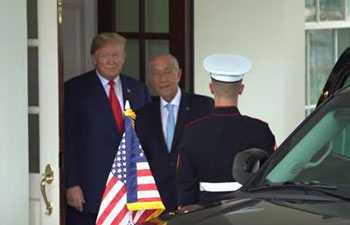WASHINGTON, July 2 (Xinhua) -- A senior U.S. official said Monday that the U.S. sanctions on Iran will snap back, and Washington aims to cut the export of Iran's crude oil down to zero "as soon as possible."
Though Brian Hook, director of policy planning for the State Department, said the measures to reduce market disruption are being taken, the U.S. movement on Iran still sparked concerns and skepticism.
ANNOUNCING SANCTIONS
In a press briefing, Hook said the key part of U.S. strategy on Iran is "a campaign of maximum economic and diplomatic pressure."
"The first part of our sanctions will snap back on Aug. 6. These sanctions will include targeting Iran's automotive sector, trade in gold, and other key metals," he said.
"The remaining sanctions will snap back on Nov. 4. These sanctions will include targeting Iran's energy sector and petroleum-related transactions, and transactions with the Central Bank of Iran."
He said the U.S. focus is on "getting as many countries importing Iranian crude down to zero as soon as possible" in a bid to reduce Iran's revenue from crude oil sales.
Measures to stabilize the oil market are also considered, he added.
As to the banking sanctions, Washington will be aggressively enforcing these provisions to lock up Iran's assets overseas and deny Iran access to its hard currency, he said.
He noted that more than 50 international firms have already announced their intent to leave the Iranian market, particularly in the energy and financial sectors.
Hook told media that since the U.S. announcement on May 8 to leave the Iran nuke deal, Washington has sanctioned 53 individuals and entities for alleged human rights abuses, proliferation activities, or acts of terrorism.
"We will continue to do so," he said.
SEEKING SUPPORTS
Hook said the Departments of State and Treasury have launched joint teams of senior officials on June 4, and have already visited 13 nations in Europe and East Asia to explain the sanctions, and "warn governments and the private sector of the risks of continuing to do business with Iran."
U.S. teams "are bringing with them a message of cooperation and coordination," he said, adding that he and an undersecretary of Treasury Department will lead a delegation to the Gulf nations in the coming days.
He will also travel to Europe at the end this week to meet officials from Germany, France and Britain, in a bid to engage in close consultations with the European nations.
Following U.S. President Donald Trump's decision to quit the Iran nuclear pact, the United States vowed to re-impose sanctions against Tehran and inflict punishments like secondary sanctions on nations that have business links with Tehran.
Firms that were doing business in Iran were given up to 180 days to wind up investments. Otherwise, they risk huge fines.
Last month following U.S. threat of new sanctions, foreign ministers and economic ministers from France, Germany and Britain urged Washington to exempt European companies engaged in trade with Tehran.
Considering the impact to global oil market due to U.S. sanctions, Hook said Washington is working to minimize the possible disruptions.
According to a White House statement on June 30, Trump had called Saudi King Salman bin Abdulaziz Al Saud to make sure that "the Kingdom maintains a two million barrel per day spare capacity, which it will prudently use if and when necessary to ensure market balance and stability."
FACING CONCERNS & DEFIANCE
To secure the pressure on Tehran, Hook said the U.S. side is not looking to grant licenses or waivers to countries continuing to import Iranian oil.
"We believe pressure is critical to achieve our national security objectives," he said. "We are prepared to work with countries that are reducing their imports on a case-by-case basis, but as with our other sanctions, we are not looking to grant wavers or licenses."
The U.S. State Department said on June 26 that it has been pushing countries to stop importing oil from Iran by Nov. 4.
Washington's withdrawal from the landmark Iran nuclear deal was widely criticized across the world. And some of its major European allies have been working to prevent the 2015 deal from falling apart.
A senior official from Iran's Foreign Ministry said Saturday that European countries will soon offer a package to protect Iran's interests in accordance with the 2015 deal, official IRNA news agency reported.
India and Turkey have been defiant of U.S. secondary sanction threats lately, challenging its legal justification.
Dalia Dassa Kaye, director of the Center for Middle East Public Policy at the Rand Corporation, told Xinhua that many European nations are not "surprisingly" taking a defiant tone given Washington's leaving of the nuke deal, which is believed to be working.
"It's certainly unrealistic to think that with the U.S. violation of the deal rather than Iran, the United States will be able to create a even stronger multilateral sanctions regimes than those existed before the JCPOA (the nuclear deal)," Kaye said.
He said the U.S. move made itself "isolated" and it's unclear whether the U.S new approach will actually produce "different Iranian behavior or a better nuclear deal."
Oil prices had rebounded strongly following the message from the U.S. State Department.













